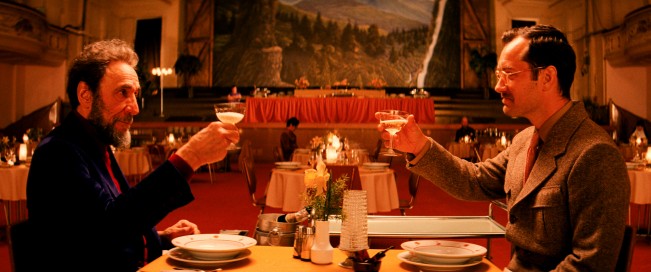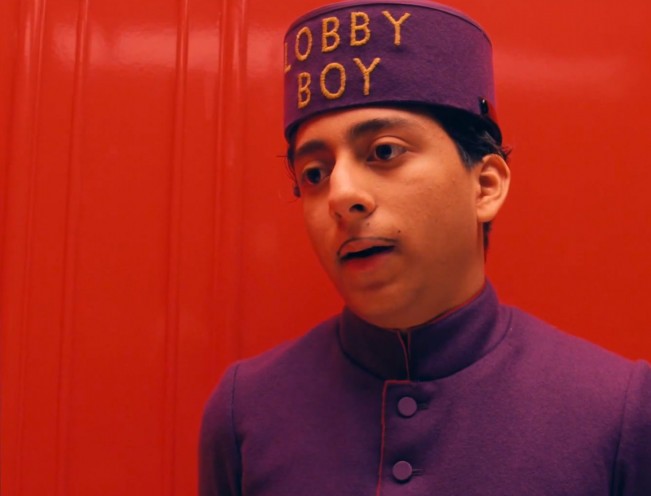By Jake Howell jake.howell@utoronto.ca
The Torontonian Reviews: THE GRAND BUDAPEST HOTEL
 Having continuously refined his style to the point where it is now immediately identifiable, Wes Anderson’s The Grand Budapest Hotel sees the American auteur’s signature meticulousness at its highest level of detail and affectation, and fans of his work will know that that is a Very Good Thing. If you’ve previously found these affectations to be pretentious instead of cute, you may be out of luck here; otherwise, this picture is very, very funny. Speaking strictly in terms of dialogue, it’s clear that Hotel’s Ralph Fiennes is to Wes Anderson as Christoph Waltz is to Quentin Tarantino, which is another way of saying that both directors have found the perfect actor to deliver their stilted monologues with comedic panache.
Having continuously refined his style to the point where it is now immediately identifiable, Wes Anderson’s The Grand Budapest Hotel sees the American auteur’s signature meticulousness at its highest level of detail and affectation, and fans of his work will know that that is a Very Good Thing. If you’ve previously found these affectations to be pretentious instead of cute, you may be out of luck here; otherwise, this picture is very, very funny. Speaking strictly in terms of dialogue, it’s clear that Hotel’s Ralph Fiennes is to Wes Anderson as Christoph Waltz is to Quentin Tarantino, which is another way of saying that both directors have found the perfect actor to deliver their stilted monologues with comedic panache.
The Grand Budapest Hotel frames its narrative like a Matryoshka doll, nesting the main story inside two other ones. At the top of the film is a girl clutching a book with the same title as the movie; coincidentally, this book tells about an author’s (Jude Law) fateful dinner with Zero Moustafa, who at a much younger age was the lobby boy to flamboyant hotel proprietor Gustave H. (Fiennes) in the 1930s. A caper surrounding a fictional painting brings Gustave and Zero closer together as friends, and we watch with pleasure as the two pair up to investigate the murder of Madame D. (Tilda Swinton) and the sensitive matter of her estate. Like Moonrise Kingdom before it, the latter half of the film proceeds to break loose and gain speed, toppling Anderson’s house of cards with precise theatricality.
 As we slip between the present to the past (1960s) to the older past (1930s), Anderson opts to switch between three distinct aspect ratios. Whether or not this accomplishes anything artistically productive will be up to you; personally, it’s kind of neat to watch a film primarily viewed in 1.33. Ultimately, however, the decision to shoot each timeline differently echoes the same obsessive rigidity seen elsewhere in Anderson’s ordered chaos, and in that sense it works. The aspect ratio is just one element to the film’s magnificent production design, which riffs on 1930s history and holds some gorgeous, striking set pieces. It’s a lot of fun to fall into.
As we slip between the present to the past (1960s) to the older past (1930s), Anderson opts to switch between three distinct aspect ratios. Whether or not this accomplishes anything artistically productive will be up to you; personally, it’s kind of neat to watch a film primarily viewed in 1.33. Ultimately, however, the decision to shoot each timeline differently echoes the same obsessive rigidity seen elsewhere in Anderson’s ordered chaos, and in that sense it works. The aspect ratio is just one element to the film’s magnificent production design, which riffs on 1930s history and holds some gorgeous, striking set pieces. It’s a lot of fun to fall into.
If over his filmography Anderson’s characteristically juvenile protagonists have slowly matured or simply become smarter, it is an aspect of his authorial style that has evolved for the better. Fiennes’ Gustave H. is an excellent Anderson archetype; his snippy air of superiority is undercut by a childish sensitive side, and the contrast is typically very humorous and witty. Fiennes does an impeccable job with the material here, which is long-winded but very quotable. Similarly, it will be well-deserved when Tony Revolori, the young actor playing Zero Moustafa in the 1930s, enjoys a break-out following Hotel.
For every casting decision The Grand Budapest Hotel gets right, though, it would seem that one of the biggest things holding Anderson back is his insistence to work with the same pool of actors. Edward Norton, Jason Schwartzman, Owen Wilson, Adrien Brody, Bill Murray, Jeff Goldblum—it’s not that these players aren’t great in most everything they do (Anderson’s past films included), but the American accents peppered throughout this movie seem out of place, too self-referential, and perhaps a little lazy. Each of these actors are suitable, but the rich, textured accents heard here by Ralph Fiennes, Mathieu Amalric, and Léa Seydoux remind that the American cameos could have been better than just “fine” or “okay” in a movie set in a fictional European country, and I’m wondering if Wes Anderson is limiting himself by playing the family reunion game with each outing.
Still, the casting here is a minor issue—these are cameos, after all. Everything else about The Grand Budapest Hotel is so finely tuned that if you don’t enjoy it, it’s unlikely because of an underwhelming script, miscalculated pacing, or anything else that generally poisons a production. Rather, this feature is one of the rare, justifiable examples of filmmaking where you can point to one person and feel entirely comfortable blaming solely them, claiming that his approach just isn’t your cup of tea.
If Anderson’s fastidiousness isn’t your thing, I’d nevertheless make a point of seeing this film anyway. What is most interesting (and important) about his work is that even his weakest features include things relatively forgotten in American cinema, like a mastery of mise-en-scène, engaging camera pans and tracking, and dollhouse master shots. I am more or less tired of the tautological maxims offhandedly summarizing Anderson’s career (paraphrased as “Wes Anderson makes Wes Anderson movies”) but admittedly, Hotel is his most recognizable work to date. Fortunately, it’s also one of his grandest.














I don’t think it’s right to say that Wes Anderson has “continuously refined his style to the point where it is now immediately identifiable”. Rather, it was immediately identifiable right out of the gate. Almost miraculously so. He’s never made a film you could mistake for any other director.